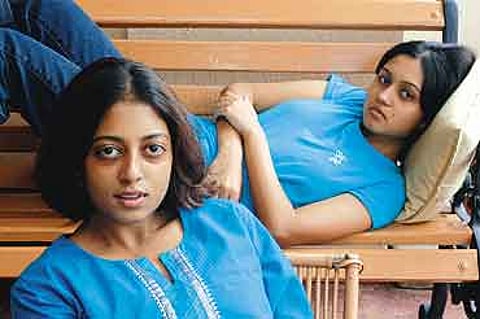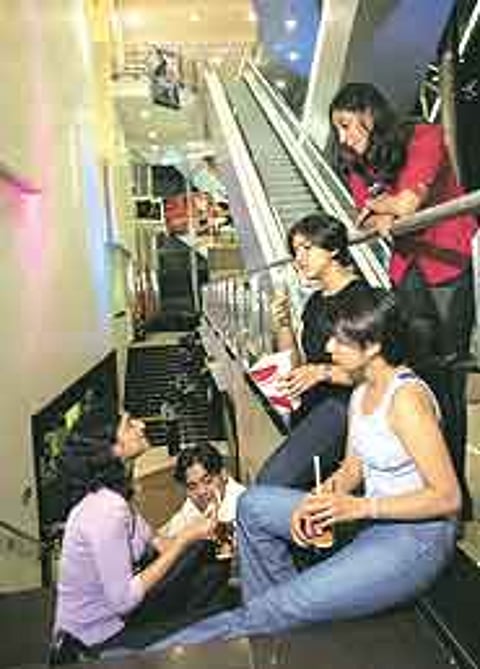"Independence for us has, unfortunately, come to mean individualism in the worst sense of the word," says Roopa Mathew, 24, who works with a multinational firm in Bangalore. She talks about how the ideals that drove the independence movement have got lost over the years. "When you read or hear about the principles of Gandhi or Nehru, you are inspired. But where does that fit into our lives?"
"We take independence for granted and it's the circumstances that made us this way," says Shane Witherspoon, 27, an editor with an online publication in Bangalore. Shruti Shwetambari, a 29-year-old media manager in Mumbai, finds that, "We have been abusing and misusing freedom and independence. I don't want to play the blame game but it is a complex mixture of our indifference and circumstances. But, the fact also is that we can make our own circumstances."
These circumstances, glossed over by an "illusion of reality", in a post-liberalisation society where malls and multiplexes and global conglomerates mushroom, have almost completely cut us off from what is actually happening outside of our metros. Or even in them. Susan Stanley, 30, who works with an international software firm in Bangalore, says, "We take independence for granted because we have never experienced subjugation." And so, their lives in this illusion are led almost parallel to reality and no one seems to really want them to converge.
"There is corruption and it'sdisgusting.It's also disgusting to see how politicians only care about themselves and makemoney.And, when you hear about how discrimination happens in rural areas, you feel terrible," says Meghana. "But, it's a momentary feeling. Once it passes, you get back to thinking about yourself and your own world. That's how I think we've all grown up—we picture the world to be as it is for us. Not for anyone else."
Rajvi Mariwala, 25, a management student in Mumbai, says, "Aren't we being raised to be the second largest market in the world? With the largest middle class in the world, aren't we all being raised to sell a dizzying variety of products to one another? English with a phoren accent and increasing buying power is our wagon to the 'first world'." Roopa agrees: "The society we live in now in cities like Bangalore is almost neo-imperialistic. We work in MNCs, shop at malls that sell international brands that are flaunted and eat at chains like McDonald's or Subway. How does this daily routine ever reflect the idea of independence as it was initially conceived?" Shane is honest when he says, "I have to think about money and about what is important to me. And I don't think that can change much."
Shruti finds that when her generation is labelled as being irresponsible or too materialistic, it is unfair as "most of us were never inculcated with a sense of community work or of reaching out to less privileged people. But then, I don't know whether it's also our fault for not imbibing these values and maybe we really have just chosen to be escapists."
With a 10-year-old daughter, Rhea, Aparajita Singh, a management professional in Mumbai, finds that parents today need to make a conscious effort to educate children about issues like the freedom struggle and independence. "My husband and I read to my daughter from Nehru's letters to Indira Gandhi, for example," she says. When role models have changed from Gandhi to John Abraham (whom Rhea and her friends worship), Aparajita talks about the onus on parents, "My friends and I have to constantly talk to our children and educate them because the environment is no longer what it was for us."
Poverty, discrimination, underprivileged children and downtrodden women—all have become the "other face" of India to the young, regardless of whether the issues are urban or rural. "It's not that my generation is unaware of these problems, we are just not interested in them, other than feeling a little compassion for the people struggling with these issues. But then 'feeling' compassion is of no use if it is not followed by action," says Susan. Shruti links this to the eternal Indian 'chalta hai' attitude—"We never pull up our socks and do anything."
Familiar Yet Strange
Raise the tricolour, stand up for the anthem and then go for that latte. Is this what Independence means for today's generation? Here's a reality check.


"When you hear about a rape case or see something on TV about atrocities, you feel terrible. But when you switch the channel, you forget," says Malavika, 14, Meghana's sister and a Bangalore high school student. Ajay Balasubramaniam, 26, who works with an IT firm in Bangalore, points out that with 24/7 news channels, internet and sms updates, you are always aware of what is happening. "So it's not fair to say that we are oblivious to the problems because we cannot be with all this media exposure."
Apart from scattered discussions over coffee or on email lists, few people actually get moving to resolve these problems. "Yeah, we discuss things, we complain about how nothing changes but we're also so immune. We don't want corruption, but what are we doing to stop it? If things don't change, that's also partly our fault," argues Roopa. Shane says that although he would like to do something to help, "I fear that the so-called agencies of change could also be corrupt to the core." And, thus, while the heart may be in the right place, the TV channel still gets changed.
Meghana reasons that this is because taking an initiative to counter a problem would be a responsibility not many want toshoulder."You appreciate your life more when you hear about these cases but you will have to go out of your way to help," she says. "About rural problems, for example, how many of us would actually be okay with staying in villages to help those people? It's like another world completely and we don't even relate to it."
They all worry about corruption, about rising crime, about giving children basic necessities like food and clothing and about raising their own children in this society, which is not really a pleasant thought. And one way to set change in motion could be through voting for the "right" politicians. But, as Shane points out, "I don't think any one of us can relate to today's political leaders. They are full of empty promises and look only to make the most money in the short time they are in office." Malavika finds all of them sounding the same and "talking about what they think we need, not the real issues."
"Too many vested interests are ruining the situation today and if we could just have some sort of goal congruence among political parties, it would help," reasons Shruti. "Independence and democracy are responsibilities for us. Or, at least, they ought to be," says Rajvi. "Patriotism is not just about standing up in a theatre for the national anthem before watching Mallika Sherawat in a steamy scene. The impetus lies with us to realise that not littering the street or demanding accountability from government is also patriotism."

Ajay agrees that independence "comes with certain riders, but how can you make people look beyond their immediate needs when that is how they have become?" He finds that there is nothing at all that connects a young person today to the freedom struggle or even the concept of fighting for independence. "History is taught to us in school and college with the intention of writing an exam and nothing more. This is where the true essence of what independent India is really all about is being washed away generation after generation."
S. Iyer, 54, who works with a multinational firm in Chennai and has a daughter in her 20s, says his generation was probably "so euphoric at the novelty of independence but also so disgusted at events like the Emergency that we got sick of murky politics." He argues that maybe they failed to provide their children with platforms to express patriotism. "So, while the young might actually be very patriotic, I think we can be partly blamed for not guiding them towards the right channels of expression."
And over the years, 1857 becomes just another date to be mugged up and Dandi becomes one more dot to be plotted on a map—learn up as much as you need to make the passing grade. Whoever else is not mentioned in those textbooks and whatever fact is not a question on the exam really does not matter. Just don't flunk the exam. This was a point driven well home by the sight of a 10-year-old on television some years ago, being asked by an anchor, "Who wrote Vande Mataram?" And the smug answer, given very confidently, was "A.R. Rehman."

Shane and Susan find that to many Indians, sadly, I-Day has become one more holiday with nothing to set it apart. And it is just that to them, too. Coming from a family that was entirely involved in the independence movement, however, Shruti says, "In small towns, one sees a flag hoisted on top of every house on August 15, and I've heard children humming patriotic songs—it's like a festival. But in a city like Bombay, maybe it is just a history lesson with students saying ' khud to mar gaye aur chod gaye ek chapter humare liye(they themselves died, but left us another chapter to learn)'."
Ajay is "fascinated by how one man's dream actually became freedom for millions" and can never think of it as just another day off work."This was a country where there were signs saying 'Dogs and Indians notallowed'. And to be where we are now... how can anyone miss the significance of Independence Day," asks Shruti.
"I do feel very patriotic on August 15. Because when I study about the independence struggle in class, I feel really moved by everything those people gave up and how they had to fight. I really appreciate it because without them, we may still have been ruled by the British," says Malavika. "But what can I really do to celebrate independence on that day apart from being present at the flag-hoisting?"
And so, at some point during August 15, either while watching the tricolour unfold, or while standing up to sing the national anthem, or catching a glimpse of the defence regiments marching past the President, or seeing the little kids selling plastic flags at traffic signals, or listening to the FM station play Ai Mere Pyare Watan, your heart does swell with pride. But then, the moment passes. You bought the flag and tucked it on your windscreen. Jai Hind. Now let's go get a latte.
Tags